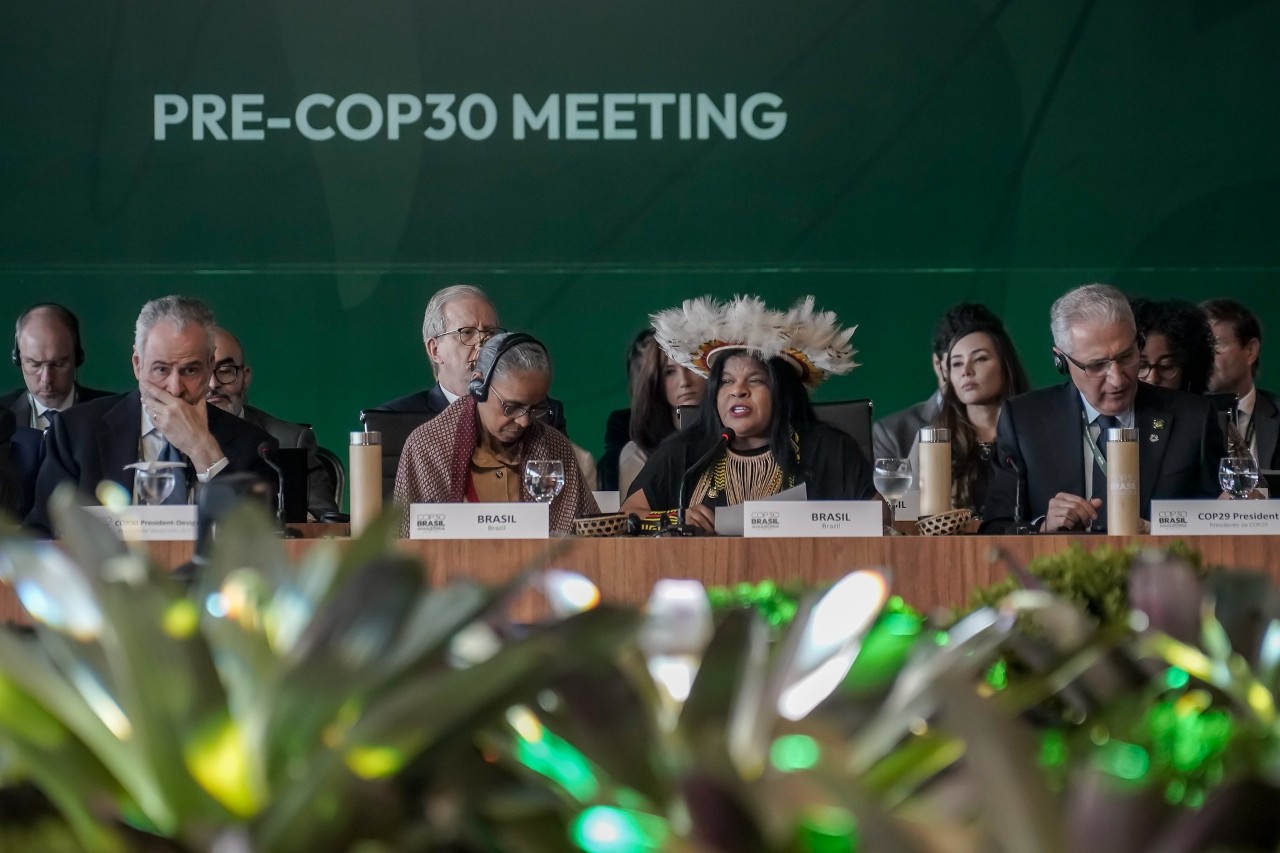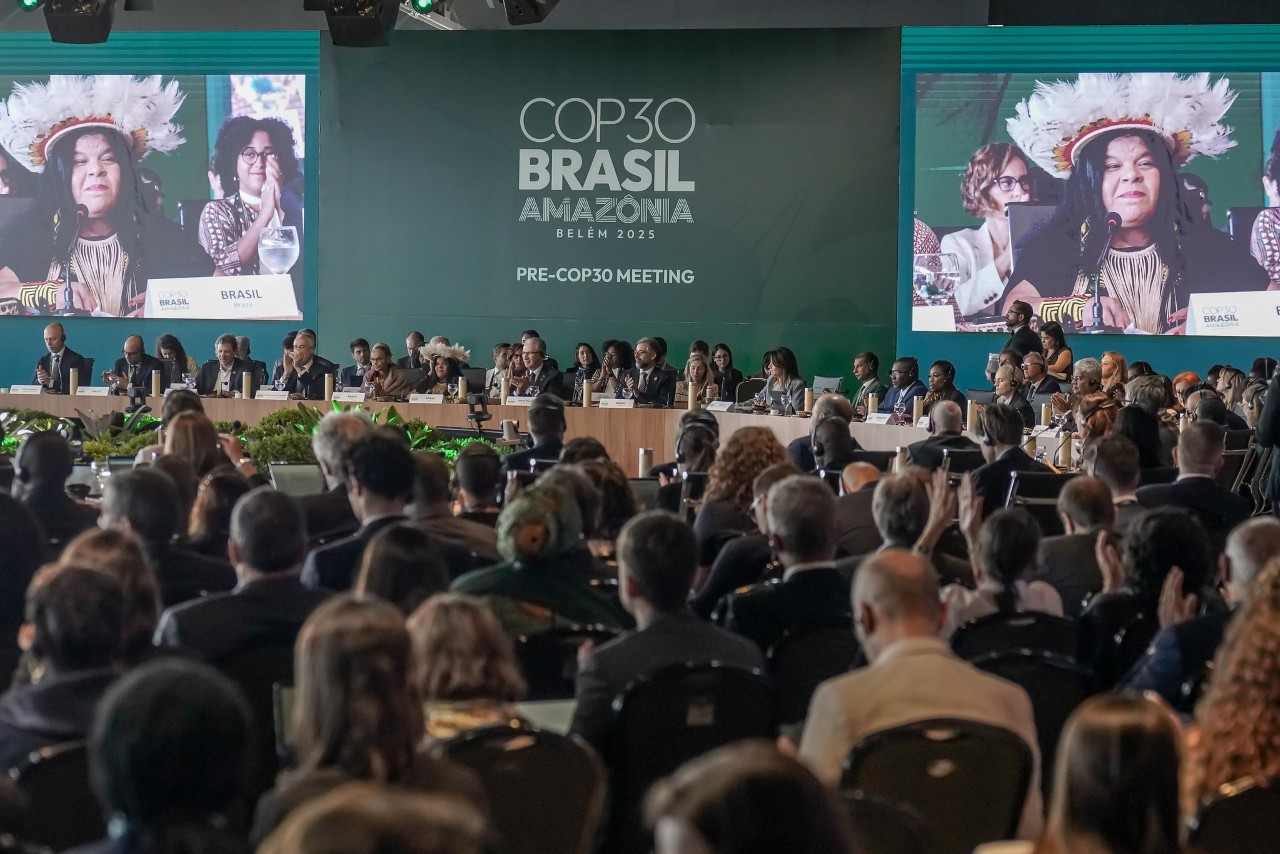Minister Sonia Guajajara Highlights Pioneering Role of the Peoples’ Circle During Pre-COP in Brasilia
Alongside Brazilian authorities and representatives from other UNFCCC member countries, Guajajara called for commitments that leave a lasting legacy for society.

By the Ministry of Indigenous Peoples
On Monday, October 13, Minister of Indigenous Peoples Sonia Guajajara took part in the Pre-COP—the Ministerial Preparatory Meeting for COP30—which convened global leaders in Brasilia. During the opening ceremony, alongside the other leaders of the Circles linked to the COP30 Presidency, the Minister spoke about the expected legacies of the Belém Conference and the pioneering role of the Peoples’ Circle.
In her remarks, the Minister drew attention to the global crisis of multilateralism and called for renewed consensus among regions, along with effective responses to the challenges posed by the climate emergency. She highlighted the Peoples’ Circle as an important innovation of Brazil’s COP30 Presidency—one capable of guiding solutions to the current crisis.
“There can be no energy transition if it replicates past processes that, in the name of progress and technological advancement, have left behind a trail of violations, violence, and inequality. Indigenous peoples and local communities are not only among those most affected by climate change—we are also part of the solution. That is why the Peoples’ Circle is such an important innovation, and why we must go further at COP30,” Minister Sonia Guajajara emphasized.
The event, held on 13–14 October at the Brazil International Convention Center (CICB), precedes the 30th Conference of the Parties to the United Nations Framework Convention on Climate Change (UNFCCC)—COP30—to be held in Belém from 10 to 21 November. The Pre-COP gathered ministers and climate negotiators to help build consensus on key topics for the Conference. Approximately 65 delegations from UNFCCC member countries were invited.
About the Peoples’ Circle
Chaired by Guajajara, the Peoples’ Circle was established to strengthen the representation of Indigenous peoples, traditional and Afro-descendant communities, and family farmers within the COP30 Presidency. It comprises the International Indigenous Commission and the International Commission of Traditional, Afro-descendant, and Family Farming Communities, the latter focusing on enhancing engagement and participation of local communities in international climate discussions.
The Circle serves as a direct dialogue platform within Brazil’s COP Presidency—an inclusive and participatory space where representatives can advance their key priorities, ensuring that traditional knowledge is respected and elevated throughout the Conference.
“In the Circle, we create opportunities for dialogue—to contextualize the preparations for Belém and to listen to and respond to the main demands. Since Paris, with the establishment of the Platform for Indigenous Peoples and Local Communities, the UNFCCC has sought ways to expand our participation and strengthen the leadership of Indigenous and local communities,” Guajajara noted.
According to the Minister, the Peoples’ Circle will operate independently, without overlapping with the existing representative bodies for these groups within the UNFCCC, such as the Facilitative Working Group (FWG) of the Local Communities and Indigenous Peoples Platform (LCIPP) and the Indigenous Caucus.
Legacies of the Belém COP
In her speech, Minister Guajajara emphasized the need for concrete outcomes that help foster global trust among societies, countering the lingering waves of climate skepticism and denialism. Addressing ministers and other international leaders from UNFCCC member countries, she outlined four key legacies expected from the upcoming Conference:
- Climate finance: The Minister called for overcoming the reality that only 1% of climate finance reaches Indigenous territories and local communities—those who hold some of the best practices and projects for combating deforestation.
- Recognition of Indigenous and local territories: Guajajara stressed the importance of ensuring that this COP produces resolutions recognizing these territories as carbon sinks and incorporating their protection into climate policies.
- Traditional knowledge: She advocated for the inclusion of Indigenous and local knowledge systems in climate adaptation indicators.
- Environmental defenders: The Minister urged member countries to recognize the vital role of environmental defenders in just transition dialogues, incorporating key rights-based principles such as free, prior, and informed consent, and addressing environmental racism to ensure a truly just transition.

Unprecedented Indigenous Participation
The minister also announced that the Belém COP will mark the largest and most meaningful Indigenous participation in the history of the UN climate conferences. To this end, the Ministry of Indigenous Peoples has created a dedicated space at the Federal University of Pará (UFPA), which will serve as both accommodation and a venue for cultural, political, and spiritual activities throughout COP30. Around 3,000 Indigenous representatives from across Brazil and the world are expected to gather at the “COP Village.”
Brazil’s delegation will feature the largest Indigenous representation ever, with 360 delegates from all regions of the country accredited for the Conference’s Blue Zone. These representatives were nominated by the Indigenous movement during the COParente Cycle—an initiative by the Ministry of Indigenous Peoples comprising 15 meetings held across all biomes in Brazil to align Indigenous perspectives, share information, and mobilize participation ahead of the United Nations Climate Change Conference.
Translation: Tadeu Azevedo (POET/UFC)
Proofreading: Michel Emmanuel Félix François (POET/UFC)
